
Patagonia made a clean sweep at the ISPO Award 2016/2017 with the world’s first neoprene-free wetsuit. ISPO.com spoke with Mihela Hladin about the outdoor brand’s other projects in the interests of the environment.
Interview with Mihela Hladin of Patagonia
ISPO.com: Your company set a goal for itself to not just manufacture high-quality product that last for years, but that can also be repaired so people have to buy fewer of them. With the “Worn Wear” project, it’s about the maximum use of clothes and how clothing that can no longer be repaired is recycled. Only a few competitors are expending so much effort in the issue of sustainability. Why are you?
Mihela Hladin: That has been the philosophy since the earliest days of Patagonia: to protect the environment and the places that we love so much. From the beginning, we had and have the guarantee of being able to return damaged clothing. But since the quality is very high, we naturally have more clothes in the stores than in the repair workshop.
With “Worn Wear,” we hope to change the way people treat their clothes. We want people to properly celebrate the clothing that they’ve owned for a long time. To use what’s already there anew. Repair as a radical, fundamental act.
And at the very end: recycling only when there are no longer any other options. Above all, people should come to grips with the subject once. Ultimately, we have a responsibility for this planet. Natural resources are getting scarcer and scarcer.
Patagonia concept: Repair before new purchases
Without a doubt, we are living in a disposable society: short-lived, technology-driven. Nowadays you’d rather replace something than have it repaired. In doing so, the price for the environment is higher than the retail price – can that be said?
Yes, that is the problem. And the fact that there are still hardly any places or workshops where you can hand over something for repairs. We operate the largest textile repair center in the USA, with more than 40,000 repairs per year. And we’ve trained the employees in our stores to carry out simple repairs themselves.
On our website, you can find more than 40 free repair instructions for Patagonia products. We’re undertaking a lot to help customers repair their equipment themselves, to pass them on, or to recycle them if need be.

But how do you sell new goods if the old one keep getting repaired again and again?
People will always buy new things, even if the brands change sometimes. It’s about consumer behavior in general, one of the most important factors in the issue of environmental destruction and ecological bankruptcy. We feel responsible for addressing this topic. People are also becoming more and more conscious when it comes to this topic. The change can be felt everywhere.
Patagonia: Creating environmental consciousness
Keyword transparency. Does the consumer actually know, then, where and how ecologically their jacket or pair of pants was manufactured?
We already disclosed our supply chains several years ago. We’re currently working together with several other manufacturers on a universal index which, hopefully by 2020, will give the consumer binding information on the origin and nature of their purchase. That's because more and more consumers are asking themselves where and how clothes are produced, what and how many raw materials were used in doing so.
Five years ago, Patagonia placed an ad campaign with a provocative claim: Don't buy this jacket.
That was pretty direct! And not without risks. But we were always good at taking risks sometimes. We wanted to make people aware that consumption is an issue. And that there is a difference between consumption and ownership. Think about it first, then buy! That avoids unnecessary CO2 emissions, waste and waste water that are associated with the manufacture of clothing.
“Worn wear” is the continuation of this message that our company has concerned itself with since its founding. The first question at my job interview was, “Which factor will the environment influence in 50 years?” That is the framework in which we think and act.
- Awards
- Mountain sports
- Bike
- Fitness
- Health
- ISPO Munich
- Running
- Brands
- Sustainability
- Olympia
- OutDoor
- Promotion
- Sports Business
- Textrends
- Triathlon
- Water sports
- Winter sports
- eSports
- SportsTech
- OutDoor by ISPO
- Heroes
- Transformation
- Sport Fashion
- Urban Culture
- Challenges of a CEO
- Trade fairs
- Sports
- Find the Balance
- Product reviews
- Newsletter Exclusive Area
- Magazine





